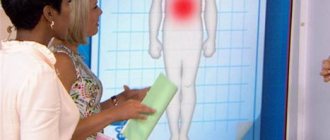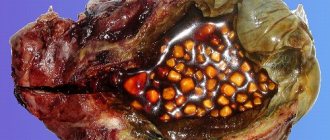When there is a baby in the family, the attention of adults is focused on his health and full development. Intestinal problems occur in every child. Parents should understand how to provide timely assistance if diarrhea occurs due to ARVI in a child, what are the causes of the phenomenon and how to treat the disease so as not to cause harm.
Symptoms of ARVI
It is not always the case that a child develops diarrhea due to viral diseases. The following symptoms are typical for ARVI:
- runny nose;
- low-grade fever;
- sore throat and pain;
- cough;
- nasal congestion due to swelling of the sinuses;
- sneezing.
Diarrhea with ARVI is uncommon. However, if these symptoms appear, the infection is determined quite simply.
If you experience acute diarrhea with nausea and vomiting, with blood and mucus in the stool, you should immediately call an ambulance.
Symptoms
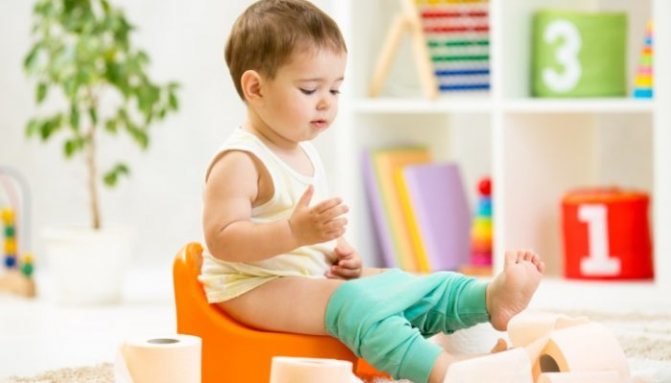
Each disease begins to be diagnosed with clinical symptoms. To do this, the doctor conducts a survey, paying attention to information received from the parents and the child himself. Complaints are detailed and supplemented by physical examination data: examination, palpation of the abdomen. And based on the information received, a preliminary conclusion is made.
General intoxication syndrome
Intoxication in children most often has a viral-bacterial origin, but the chemical nature of the changes cannot be ruled out. The body reacts to the entry of a foreign agent into it by activating its defenses, which can manifest itself in different ways. In particular, there is nausea and vomiting, increased intestinal motility (diarrhea).
General intoxication syndrome is very often observed with respiratory diseases, such as influenza. This is an infection that affects not only the respiratory tract. The virus has a pronounced toxic effect on the nervous and vascular system. Therefore, the main symptoms of the disease will be the following:
Catarrhal phenomena are also present. At first the nose is stuffy, but then watery mucus comes out of it. The throat hurts infrequently, but a dry cough is typical. Damage to the respiratory tract can result in bronchitis or pneumonia. But the toxic effect on the body in a number of patients is manifested by pulmonary edema, encephalopathy, and glomerulonephritis.
Rotavirus infection
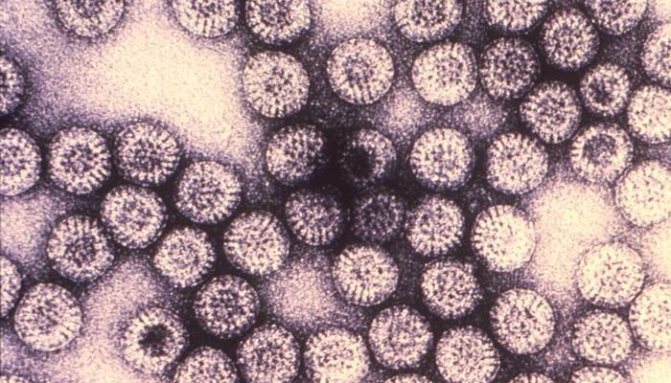
Most often, when diarrhea appears against the background of cold symptoms, they think about rotavirus infection. The disease affects the digestive tract, which is why it is nicknamed “intestinal” or “stomach” flu. The infection is transmitted by the fecal-oral route (with food, water) or by airborne droplets. First, a prodromal period occurs, in which there will be the following signs:
- Cough and runny nose.
- Redness of the throat mucosa.
- Fever.
- Weakness and malaise.
- Nausea and vomiting.
Young children become capricious and lethargic and refuse to eat. The virus then enters the intestines, where it multiplies, causing damage to the digestive system. Diarrhea is observed due to increased cellular secretion and bloating. The feces become grayish-yellow in color, and the urine darkens. The illness lasts about a week.
The so-called intestinal flu is a very common cause of diarrhea that occurs against the background of cold symptoms.
Enterovirus infection

Another infection that fits the description is enterovirus. It is most often caused by the Coxsackie and ECHO viruses, which are transmitted through food, water or household items. The disease in adults and children can have a lot of variations and corresponding clinical manifestations. Among them it is worth noting the following:
- Fever.
- Pharyngitis with tonsillitis.
- Herpetic sore throat.
- Abdominal pain.
- Dyspepsia (nausea and vomiting, diarrhea).
- Meningeal syndrome.
- Skin rash (exanthema).
List of viruses that cause diarrhea
If a baby often suffers from acute viral respiratory diseases, it can be difficult to determine the pathogen. The symptoms are very similar. However, intestinal upset is possible only when the following viruses penetrate:
- reovirus;
- enterovirus;
- flu;
- adenovirus;
- rotavirus.
It is worth taking a closer look at the symptoms of the condition in some types of infection.
Intestinal upset due to influenza
Severe intoxication does not always occur with ARVI in children. When it comes to the flu virus, things are different.
ARI not associated with viral infections usually affects only the upper respiratory tract. If a child gets the flu, the whole body suffers. The picture of the disease is rapid, symptoms increase quickly. Literally 3–4 hours after the flu enters the body, the following symptoms appear:
- headache;
- temperature up to 39–40 degrees;
- redness of the mucous membranes of the eye;
- dry debilitating cough;
- chest pain.
We recommend: Causes and principles of treatment of diarrhea with mucus in an infant
Loose stools during ARVI in a child caused by the influenza virus have the following features:
- frequency up to 5–8 times a day;
- no blood impurities;
- may be accompanied by gagging;
- watery stool.
If such symptoms appear in a baby, you should immediately call an ambulance. Self-medication has disastrous consequences.
Intestinal upset due to rotavirus
Rotavirus infection is transmitted by airborne droplets. Both children and adults become infected. They occur in the form of mass morbidity in children aged 7–8 years, when they find themselves in close children's groups.
The symptoms of the disease are the same as for influenza infection, but the body temperature does not rise above 38 degrees. The condition is accompanied by abdominal pain and general weakness.
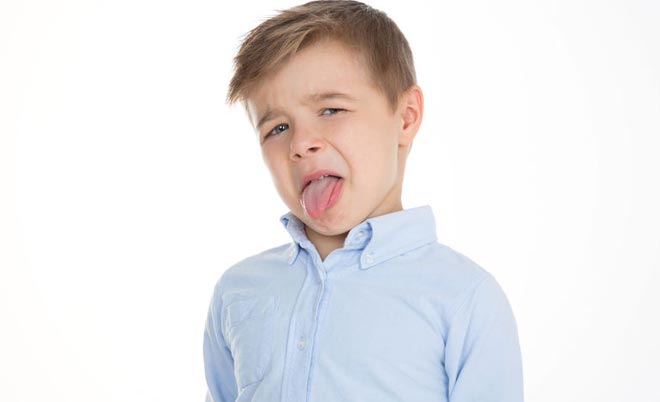
Outbreaks of morbidity usually occur in the summer, when infections are not killed by exposure to frosty air, and food spoils quickly.
With rotavirus infection, stool has a yellowish tint and a liquid, but not watery consistency. It is important to exercise caution and take personal protective measures, as this infection can easily be transmitted to other family members.
Diarrhea due to adenovirus
Diarrhea due to a cold caused by an adenovirus infection is accompanied by the following symptoms:
- temperature;
- enlarged lymph nodes and pain on palpation;
- stomach ache;
- dizziness;
- headache;
- lethargy and increased fatigue;
- redness of the throat;
- nasal congestion.
Infection can occur at any age. When the baby is 6 months old, parents should be especially careful, because adenovirus can affect the development of the brain, cause inflammation of the meninges and affect kidney function.
Necessary preventive measures
In order not to become infected with infectious diseases and, while catching snot, not to think about why you got sick. Preventive measures should be followed:
- After visiting public places (transport, toilets, hospitals, etc.), you should always wash your hands.
- Do not eat food of unknown origin or that looks suspicious.
- Do not eat unwashed vegetables and fruits.
- During viral epidemics in crowded places, you should wear a medical mask, but remember, it should be changed every hour, as it becomes contaminated with germs.
- If one of the family members gets sick, then you should isolate him in a separate room, allocate dishes and towels that only he would use.
- Regularly ventilate rooms in the house to prevent dust and germs from accumulating in the air and disinfect the rooms.
- Temper your body, jogging in the cold, contrast showers and exercise have always worked wonders.
- For older people, you can hang a bag around your neck filled with chopped onions or garlic, which contain many phytoncides and will repel germs.
ponosa.net
Principles of treatment
Acute respiratory viral infection is rarely accompanied by dyspeptic symptoms. If this happens, a comprehensive treatment should be prescribed by a doctor.
First aid
Until the prescribed drugs take effect, the body should be helped:
- increase the volume of fluid consumed;
- take sorbent drugs;
- take antipyretics;
- follow a diet.
We recommend: Are diarrhea and cough dangerous in a child without fever - what do parents need to know?
Increasing the amount of fluid is very important. In this way, you can protect the body from dehydration, the most dangerous complication of intestinal disorder. If you had to provide assistance to a child aged 2 years or less, you can give water in teaspoons every 10 minutes. This method maintains a normal volume of fluid in the body.
Sorbents are allowed from an early age. If any drug has not yet been used, you should consult your doctor before using it. For children, Smecta or Enterosgel is recommended. Older children and adults can use activated carbon or Atoxil.
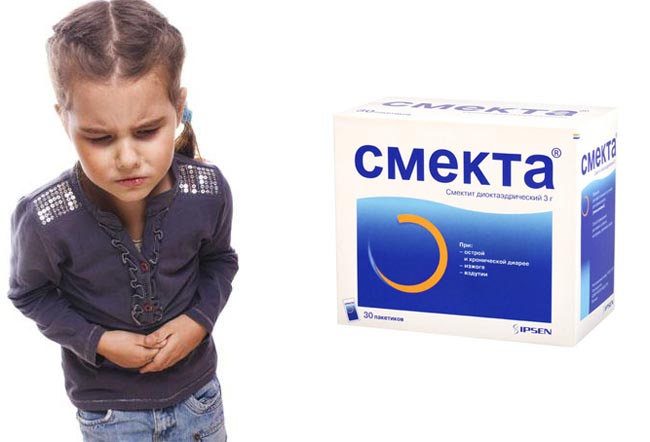
Antipyretic drugs can be taken when the thermometer exceeds 38.3 degrees. When treating infants, any increase in temperature should be a reason to contact qualified specialists.
Diet for intestinal disorders, even for viral diseases, is very important. Proper nutrition allows the digestive system to recover faster. The table below describes the main recommendations and contraindications.
| Recommended foods for diarrhea | What is contraindicated |
| Chicken bouillon | Kefir |
| Rye bread | Milk |
| Crackers | Fresh fruits and vegetables |
| Congee | Meat and fish |
| Puree | Alcohol |
| Cracker | Coffee |
After the acute phase of diarrhea has passed, you can introduce a small amount of bananas, lean fish and meat into the diet. It is important to avoid frying. It is better to cook dishes by steaming or in the oven.
Further treatment
After the acute symptoms of an intestinal disorder have been overcome, it is important to deal with the cause that caused the negative condition. Regardless of the patient's age, it is necessary to take antiviral drugs. The doctor chooses the medicine. Selecting a remedy on your own can be dangerous, especially for a child’s body.

To prevent the disease from having negative consequences, it is important to maintain bed rest throughout the entire period of illness. The less stress, the easier it is for the body to cope with the disease and return to its usual pace of life.
We recommend: What antibiotics and how to use them for diarrhea in children?
To maintain digestive processes, children over one year old can use drugs that normalize the intestinal microflora. It could be Hilak or Linex. It is not recommended to use such medications at an earlier age, since the intestines must learn to stimulate the production of these microorganisms on their own.
For adult children, medications containing enzymes may be recommended. Such drugs are used only as prescribed by a doctor. It could be "Mezim" or "Festal".
Methods for treating diarrhea due to a cold in a child
Treatment of diarrhea in a child due to colds can only occur after consultation with a doctor. Self-therapy can harm an unformed body, aggravate the condition and lead to the development of dangerous consequences.
Treatment of diarrhea in combination with treatment of infectious infection is divided into several stages:
- Treatment of ARVI. To carry out it is necessary to determine the exact cause of the ailment and identify the causative agent of the disease. This is done through laboratory testing of the biomaterial and visual examination of the patient. To suppress the activity of the viral infection, children are prescribed a course of antiviral immunostimulating drugs. Most often these are medications that contain interferon identical to natural. In pharmacies, such medications are sold under the names Interferon, Viferon, Laferobion, Laferon, Anaferon. In certain cases, the child is prescribed antibiotics to prevent complications if a bacterial origin of the intestinal disorder is suspected. To restore immunity at home, use rose hips, raspberries, and fruits rich in vitamin C. It is recommended to frequently ventilate the room where the patient is, arrange wet cleaning, and keep the air temperature during the heating season within 18-22 degrees.
- Elimination of diarrheal symptoms. The child is prescribed special antidiarrheal drugs. Medicines that inhibit intestinal motility, bacterial agents and sorbents are used. The former stabilize motor skills, eliminating spasmodic attacks. The latter are relevant for dysbiosis, suppress the growth of pathogens and restore the balance of beneficial bacteria. The latter are needed to bind and remove toxic particles produced by viruses from the body. For children from an early age, Nifuroxasid, Enterofuril, Smecta, Enterol, Enterosgel, Bifidumbacteril, Lactovit are used. The dosage and course of treatment are determined individually, based on the patient’s age, severity and duration of symptoms.
- Normalization of water-salt balance. With diarrhea and hyperthermia, the body suffers from excessive fluid loss. Without replenishing its supply, there is a risk of dehydration, which is dangerous to health and life. In most cases, rehydration is carried out at home, providing the child with adequate, abundant fluids. But sometimes (for example, with vomiting) special medications for oral or intravenous administration may be needed. These include Regidron, Orsol, Resol, Normagidron, etc.
Antipyretic drugs are used to reduce fever. Ibuprofen and Paracetamol are suitable for children.
When treating diarrhea during ARVI, it is necessary to provide the child with the right diet. The menu should be rich in vitamins to restore immune defense and have astringent properties. The best foods for diarrhea are rice (porridge, broth), meat broths, and dried fruit compotes.
Dangerous consequences
Diarrhea after ARVI leads to the following complications:
- dehydration;
- deterioration of blood supply to the brain and other organs;
- violation of water-salt balance;
- decreased immunity.
Incorrect treatment can also have consequences:
- breathing problems;
- dyspnea;
- ear infection;
- sinusitis;
- laryngitis.
To minimize the risk of complications, it is important to start treatment promptly and always consult a doctor.

